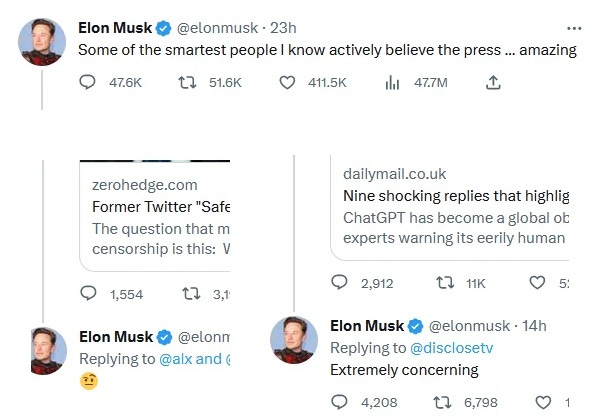Cargo Cult Rhetoric and Scarecrow Science
Why intelligent people frequently use lousy sources (and they may not know they're lying)
Today I’m going to attempt to answer the question: Why do intelligent people frequently back up their claims with such lousy evidence? Why does accredited psychologist Jordan Peterson (who worked high up in academia and should know the process well) tweet out only self-published dumpster-tier pseudo-studies to back up his pet causes such as anti-vaccination activism?
Why does Elon Musk, whose whole thing is deriding journalism’s partisanship and lack of integrity, prefer to draw all of his news from tabloids so lowbrow that you wouldn’t be surprised if Bat Boy made an appearance?
To answer this, I’ll start with a personal anecdote.
Nearly 20 years ago now, when I was barely out of high school, I had it in my head that I was going to write either a book or a documentary debunking climate change. It’s impossible now, of course, to unacquire the following decade of personal growth in order to fully grasp what was going on in my head for me to think myself qualified for that, but I do know that I’d just read Michael Crichton’s novel State of Fear and I was all rah-rah-gung-ho about fighting a cultural enemy I didn’t yet understand and couldn’t define.
Ten years later, this enemy would be called SJWs. Twenty years later it would be called the Woke Mind Virus. Always it’s a monster in the closet that was poised to leap out at disaffected kids like me, according to grinning old men in the media.
Of course, if I was going to sell it then I was going to need to make sure the research was solid—I was going to need a lot of sources to back up what I was saying. And they were going to have to look legitimate if they were going to cut through the noise of all these climatology papers and the findings of the IPCC. Complicated stuff I couldn’t read or understand—but of course that’s how they get you.
It's important to understand that it’s not that I didn’t truly believe climate change was a hoax. I wasn’t being funded by oil companies. Somehow in my mind at the time I just never really identified truthful knowledge as being a product of research and discovery. I thought it was a product of rhetoric.
In short, I knew climate change was a hoax. I had been convinced of it rhetorically, and that was how I was going to need to convince everyone else.
So I willingly distorted the shape of the debate. I put together a research outline that cherry picked data, ignored large swaths of argument that were inconvenient to my position, and gave the opposition’s statements the absolute least charitable treatment that I could. I identified portions of climate activism I could use to draw bad and false analogies to religion so that I could compare environmentalism to a cult and thus write its adherents off as completely nuts and not worth listening to.
At no point did I actually feel that I was lying or deceiving even when I was manipulating data in ways I knew were uncharitable or misleading. I was debating. I was convincing.
Thankfully I grew out of this folly. Largely through my determination to create the most rock solid climate hoax expose ever, and some good old tertiary education in philosophy, I eventually realised there was just nowhere near enough compelling evidence that climate change is a hoax. I broke myself out of the mindset before I made a laughing stock of myself.
Others never really learn this idea, that rhetoric is not the parent of truth. That’s how you get Ben Stein hilariously opening his documentary Expelled—about the theory of evolution being a lie—with a credits sequence of footage of the Berlin Wall being built.
From personal experience I think it’s important to understand hat, among ideologues, there are those who realise they’re lying and those who don’t. The former tend to prey on the latter, who in turn prey on the rest of us. It’s like a food chain or a pyramid scheme of bullshit. People like Tucker Carlson, he knows he’s lying. He’s a piece of shit. You get down to the likes of Jordan Peterson, and things become less clear cut.
The way ideologues like Peterson do science kind of reminds me of a cargo cult. If you’re unfamiliar with the term, it refers to uncontacted tribes back in World War II who were suddenly thrust into the global world when militaries from industrialised nations started landing on their islands and building bases to aid the effort to blow each other up for silly reasons. The invaders would land, built their airstrips and fortifications, and before long planes would start landing and dropping off supplies.
Now the natives were smart enough to draw some conclusions about what was going on, but they didn’t really understand how any of this technology worked. All they could do was kind of put two and two together. After the invaders left and took all their equipment with them, the natives wanted their own cargo delivered, so they did what they thought, with limited information, was the clever thing. And it was clever. They built their own airstrips out of bark and vines, made coconut radios, probably trained some monkeys how to do semaphore, and waited for the planes to arrive.
The planes never arrived because the natives had only created a very impressive looking scarecrow of sorts. It just looked like an airstrip but didn’t include any of the elements that made it work as one. They didn’t understand why it didn’t work. Likewise, when Jordan Peterson comes out with his Daily Wire approved right wing talking points about climate change or vaccinations, he works very hard to build an impressive rhetorical structure that looks like scientific evidence, but doesn’t understand why it doesn’t work.
Peterson’s own persona works to add weight to whatever he decides to boost. His employer, Ben Shapiro’s right wing media conglomerate the Daily Wire, refers to Peterson as “The smartest man in the western world.”
But you have to be very vigilant when someone throws this kind of appeal of authority at you. Peterson is a clinical psychologist. He’s read a lot of Carl Jung. That doesn’t instantly make him an expert on climate change any more than being a remarkable chef means you know better than anyone how to change a lawnmower engine.
An enormous amount of cargo cult rhetoric falls into that trap. You take a bunch of people with doctorates in God knows what, give their collective a professional sounding title, and cloak their research in fancy language. You know nobody in your audience is going to read it or understand it, but that’s not necessary because 90% of your job is already done. You have a claim and you have a source.
Let’s take Peterson’s tweet from earlier.
What do we see? A dire, non-specific warning from Peterson about what follows. An academic article with an academic title – it’s about COVID-19 vaccine fatalities. The abstract says it’s “now well established” that the vaccine is a terrible scourge, and you know if something’s well established then you don’t need to elaborate on it.
What do we really have here? Well, first of all, it’s on Researchgate, which is a website many people mistake for an academic database but it’s actually a social network. It’s LinkedIn for academics, and I’m not trying to insult it, that’s literally what it is. A paper appearing on Researchgate doesn’t say one thing or another about its credibility.
Since this tweet, the article actually appears to have been deleted, possibly due to the scrutiny that the tweet brought upon it, but I traced it back to its origin. Straight off the bat – this is not a published paper. Or rather, it’s only published in the same sense that this blog you’re reading right now is “published.” It is not peer reviewed, which means it has not been scrutinized or verified by anyone in a scientific field, and it’s not in a journal. It’s a PDF on its writers’ website, which is something called Correlation Research in the Public Interest.
Still looks pretty legit? A very cursory investigation reveals that this is just an anti-vaccination site with a hundred dollar basic package out of the box website design they probably bought from Wix. It says cryptically that it conducts “independent scientific research on topics of public interest” but one hundred percent of the articles on the site are anti-vaccine stuff. It lists the researchers that make up the group – they are mostly physicists. There is also a psychologist, a “herbalist,” and, yes to be fair, a couple of virologists. One of the authors of the study Peterson shared, I tried to find her credentials and all I could uncover is that she’s a dance instructor.
And this is an extremely common tactic in this style of dressing up research to make it look legitimate – organizations that sound like very professional research groups are often ideological think tanks at best, or lobbying groups or straight up fronts for major corporations at worst.
For example, see three of Peterson’s retweets from just through the course of a day or so:
Of these three organizations, how many of them would you guess are actually ExxonMobil?
If you guessed “all three,” you are correct.
Again, you can’t be sure to what degree Peterson actually realises how much of the “research” be boosts is bought and paid for propaganda deliberately manufactured by people who know they are lying for a paycheck, and you can’t be sure to what degree he thinks there is anything wrong with that.
And that, I think, is important to understand whenever you’re tempted to look at the world as a battleground of deliberate misinformation. A hell of a lot of liars don’t think they’re lying because even when they know they’re being manipulative, they think that’s just how it works. Like an islander trying to call for supplies on a coconut radio thinks that’s how it works, because it is a very realistic looking radio. They think they’re just being clever. And in a sense they are.
Sources of information always seem more reliable, too, when they tell you what you already believe. It’s called echo chamber for a reason. And you can see it in action when you ask someone who is trying to sell you an ideology what their favourite news sources are.

One of the most valuable skills I ever picked up wasn’t from academia. It was during some years I spent as a contract editor for Cracked, which at least at the time leaned heavily on being as factual as it was entertaining. A big part of the job was verification—ensuring that we weren’t feeding our readers bullshit. Hell, a lot of the most popular pieces were focused on correcting popular misconceptions. We never as a point of principle sacrificed truth even for entertainment. If it wasn’t true to the best of our ability to verify, it didn’t run. Sure we got things wrong, but we tried our best not to.
You learn very quickly in that line of work that is a hell of a lot of misinformation out there and most of it isn’t even intentional. People are tempted to massage facts to fit a narrative, or to fit a pattern, or to make it more entertaining, or just to avoid disappointing people with mundane realities. That’s part of what makes conspiracy theory so enticing. It’s exciting.
And that’s the danger. You want things to be a certain way, so you build your airfield and wait for the planes to come. If it doesn’t work you tell yourself you just need to build a more convincing coconut radio. But you have to look at what you’re reading no matter how professional it looks from the outside and you have to think about the motives behind it and the process involved in shaping it, because the people misleading you might not realise they’re doing it.
I never did. I thought it was just how things worked.



















